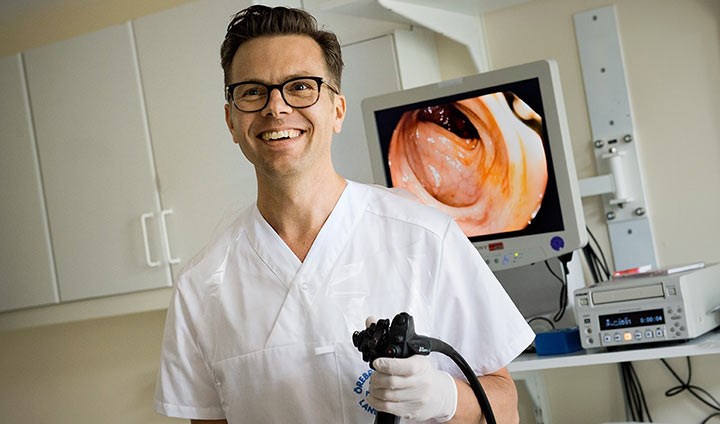Major fluctuations in the bacterial flora in patients with inflammatory bowel diseases

Patients with severe intestinal diseases have major fluctuations in their bacterial flora, as shown in a new study published in Nature Microbiology. Jonas Halfvarson, researcher at the School of Medical Sciences, Örebro University, notes that flora in patients varied from being healthy to an almost complete disappearance of certain good bacteria.
Researchers have identified a "healthy plane" based on the bacterial flora of healthy individuals, and many patients with inflammatory bowel diseases, do periodically have a good bacterial flora falling within the framework of a healthy person.
"The chief difference is that healthy people have a stable bacterial flora in their gut, as opposed to people with inflammatory bowel disease," says Jonas Halfvarson.
International collaboration
The study, a collaboration between researchers from the US, Germany, Spain and Sweden, followed patients with inflammatory bowel disease over two years. 128 patients, mainly with Crohn's disease and ulcerative colitis, are included in the study and are compared with a small group of healthy persons. All participants submitted stool samples every three months.
"The analysis shows that certain bacteria intermittently disappeared almost completely in certain patients, which is unusual in a healthy person. We can also see a connection between increased medication due to a relapse, and a more volatile intestinal flora."
The character and genetic changes of intestinal microflora, can be linked to different subsets of diseases, but the exact impact of environmental factors, such as diet and smoking, have not been yet fully investigated.
"Intestinal dynamics are more complicated than that. To truly understand what is happening, we would like to do more surveys with a higher frequency. In this study, we sampled every three months, but optimally we would like samples every day, but perhaps few persons would be willing to participate in such a study."
The goal is more effective treatment
Jonas Halfvarson continues, "If you can succeed in identifying when a patient's intestinal flora is within the confines of a healthy bacterial flora, then we could focus on developing treatments to help prevent a relapse."
The goal is that research will lead to new and more effective ways to diagnose and treat diseases, which when untreated, often mean a lifetime of suffering.
Crohn's disease and ulcerative colitis are debilitating intestinal inflammatory diseases, causing bloody diarrheal, abdominal pain and weight loss in those affected. The consequences are often life-long medication, hospitalization, reduced work, surgical treatment and lower quality of life.
It is currently estimated that at least one per cent of the Swedish population suffers from some form of chronic inflammatory disease in the gut, and over the past ten years, Crohn's disease has increased particularly sharply in children and adolescents.
Causes still unknown
The causes of the disease are still unknown and there are no curative treatments. Treatment is largely aimed at moderating the inflammation with cortisone, low doses of chemotherapy and biological drugs known as TNF inhibitors.
"We are a step closer to understanding the disease. Although we already knew that some good bacteria are fewer in persons with inflammatory bowel disease, we have now observed a higher rate of change than we have previously seen."
The study is a collaboration between Örebro University, Pacific Northwest National Laboratory (USA), University of California (USA), the Max Planck Institute (Germany), Karolinska Institute (Sweden), Indonesia Health Research Institute (Spain), and Juniata College, Pennsylvania (USA).
Text: Linda Harradine
Translation: Jerry Gray
Photo: Kicki Nilsson/ICON
